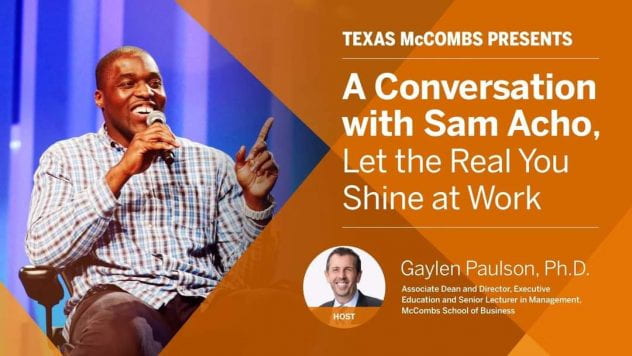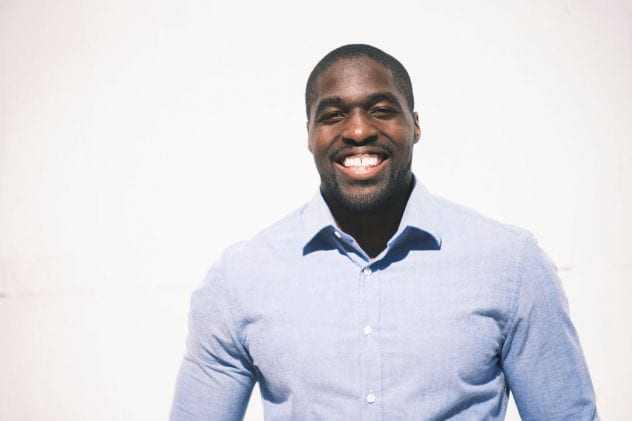Sam Acho
At Canfield BHP, we have had the privilege of knowing many amazing students who have gone on to be outstanding leaders in their respective fields. Getting to see our students evolve into leaders who not only lead Fortune 500 companies or go on to realize their dream goals but more importantly, change the world, has been our highest honor. The path to being a great leader is not without its struggles. Some of the best leaders that have come out of our program have known failure and understand more than anything, what it means to rise and come out on top at the end. A model who can best represent this story is Canfield BHP alum, Sam Acho.
A UT and Canfield BHP 2010 alum, Sam is notably the recipient of the 2010 Campbell and Wuerffel trophies respectively, a former UT Longhorn outside linebacker, and former NFL pro football player for the Arizona Cardinals, Chicago Bears, Buffalo Bills, and Tampa Bay Buccaneers. In addition to his outstanding resume, Sam is also a writer and author of his new book titled Let the World See You: How to Be Real in a World Full of Fakes. We caught up with Sam to hear about the influence Canfield BHP had on him as a student and how he overcame some of his struggles. Along the way, we learned what inspired him to write his new book, what it means to him, and how his story can help teach you how to be the real you.
Before you read on, if you haven’t seen Sam’s interview with McCombs Associate Dean and Director of Texas Executive Education, Gaylen Paulson, we recommend you watch it first as there is quite a bit of context in that interview to help you follow parts of our blog piece. Click the image below to watch. The video starts at 3:54 as Sam starts to talk about his time at Canfield BHP.
 Find Sam Acho’s new book, Let the World See You: How to Be Real in a World Full of Fakes online at Amazon.
Find Sam Acho’s new book, Let the World See You: How to Be Real in a World Full of Fakes online at Amazon.
You talked about your struggles during the appeal process at Canfield BHP. You ultimately succeeded because you were persistent and resilient. What does that say about your ability to overcome issues and thrive in a time of struggle and difficulty? How can students learn to be more resilient in the same way?
Well, the first thing you need is people who believe in you. I had applied and gotten into (Canfield) BHP and it was great. It was exciting. It was the fall of my sophomore year and I was getting more playing time but it was also football season. I said “I’ll be fine with grades. I’ve been fine before, I’ll be fine again” and I wasn’t. The minimum GPA requirement was maybe a 3.5 or 3.25 and I’d gotten an A, B, and C in three (Canfield) BHP courses. Which, if you do the math, it’s a 3.0 – under the requirement. Once again, I said, “well, I’ll be fine”. It was football season, I was busy. “Come springtime, I’ll be back. I’ll be 4.0 and above and I’ll be great.” Then the administrator says, “Sam, it doesn’t work that way. We have students from all different backgrounds, all different issues and you’re no different than them. Yes, you have football requirements. We have students who are taking care of family members, we have students that work full-time jobs and they still keep up with these requirements. So we’re sorry, you are now out of the program.” I said “okay, well no big deal, I’ll appeal.” I heard about this appeal process so I appealed. I just jotted a little note, “It was a busy season. I’m sure you saw our record. I’ll be fine in the spring” and they rejected my appeal. At that point, I was shocked because usually you ask and you try and it works but it didn’t.
This is when I say you have to have someone who believes in you. I told my dad and I said “well, I guess I’ll just be in the business school, which is fine. It’s still a great program.” He said, “no son, I need you to appeal again.” He had read what I had written in my initial appeal. He said, “appeal again but this time, tell them who you really are. Tell them about who you really are, not just what you think people want to hear who you are.” And I looked at him like he was crazy. Why would you want me to persist in that way to appeal again? They said no once, they said no twice, what are you talking about? He said, “tell them who you are” and so I did. Sometimes it takes almost looking crazy, risking looking like you’re nuts to be able to achieve your goal. For me to get kicked out of a program is one thing; to appeal that decision is another thing. To appeal against something unheard of is a whole different stratosphere but I had someone who believed in me. That belief was transferred down to me. I appealed and I just gave it my best shot. I told them who I really was, what I cared about, and how I knew I would provide value, not only to myself but to the program. After that, I believe they followed up and they accepted that appeal. But I followed up on my word. Everything changed, my actions changed, the way I studied changed. I would take my books with me to the Texas-OU game. The night before, I’m studying. I’m not watching film, I’m studying and yes, I still played well in the game. So that’s what it became and then I would go on to win the Campbell Trophy (the academic Heisman Trophy). I just say all that to demonstrate that it took an inflection point – a decision point – a point where you go one way or another and because I had someone who believed in me, I decided to allow that belief to transfer. That’s how I got to where I’m at.
How did your challenges both academically and outside the classroom at Canfield BHP prepare you for the real world?
Interestingly enough, I thought “these are just classes. I’m never going to use this stuff in real life. Let me just get the grade and move on.” Then I ran into a professor by the name of Dr. Prabhudev Konana. He’s the one who taught me what it was like to learn, and you might ask what does that mean? Well, initially, I was just after a grade, like most competitors, most achievers, I just wanted the grade. We were taking a class – MIS 301 Honors (MIS 301H) and I didn’t know anything about management information systems. I just wanted the grade and I caught myself being very frustrated and not understanding why I wasn’t getting it – why my grades weren’t reflecting my desire. Then Dr. Konana looked at me and he said, “Sam, don’t worry about the grade, fall in love with the content and the grade will follow.”
You asked, how did my time at (Canfield) BHP prepare me for the real world? Well, what I learned was how to fall in love with content and fall in love with what I was doing even if it initially didn’t seem interesting to me. There’s so much that may not initially seem interesting to you but fall in love with it and all of a sudden, you’ll get joy from it and then the grade will follow. The last thing on my mind after a little bit of falling in love with the content was the grade. It just became “oh, wow, I’m learning about MIS, I’m really learning about SAP and these different systems” that I may not use now, but just the idea of falling in love with something – that’s what changed me.
What was the inspiration behind writing this book, to begin with? What do you mean by the “real you”?
I’ll start with the second question. First, what do I mean by the “real you” I think, even freshmen on their first day of college, the first day on campus, even recent graduates on their first day at a new job, are trying to figure it out. I think a lot of us know who we are but we’re afraid to show that person to the world. Whether because of fear, shame, doubt, or uncertainty of what the future holds. Those are just a few things that keep us from showing and sharing this person with the world and so when I say the “real you” that real you is this person that’s saying “hey I’ve been hiding, but this is me. This is me.” For me, it was in the (Canfield) BHP program. We’re all smart kids, whatever but shoot, I’m a football player too. So I will go out with my teammates, listen to rap music, and do my thing. Well, do I show that to my classmates? Do I not? I remember, funny enough, I went out with some of my teammates one day – this is how I forged a relationship with some of my friends – we were going out, and all of a sudden I ran into this dude who I recognized from my business honors courses. I did a double-take and it was that guy, Kayolan “Kyle” Haramliysky, I said, “Oh wait, you actually go out? You have fun? You don’t just study? You actually can do other things?” For me, the “real me” was showing my football guys that I love learning, I love studying, or to my classmates that I also love sports, I love rap music, and I’m more than meets the eye. Showing them the real me, which is someone who I already knew, was the challenge. That’s what I mean by the “real you”.
Secondly, what was the inspiration behind the book? Well, the inspiration behind the book was this idea that I would oftentimes role switch. In front of my classmates, I would act smart, nerdy and say “all I care about is school”. But in front of my teammates, I would say “I’m only football and I love football. It’s all I care about”. I wouldn’t show people the real me and it was suffocating, it was frustrating, it was annoying, and it was weighty to try and wear all these masks. I’m talking about a figurative mask. But wearing all these masks and carrying this weight of how do I make people see who I think they want. This book is like a cry out to people to say, “Hey, no. Let the world see you because when you do, God gets the glory. The people around you benefit, and the world around you thrives. Oh and by the way, you receive freedom as well.” When you’re you not only do you receive freedom but you also help other people be free to be who they are as well.

